For dehydrating green beans, just as in canning green beans, you want to start with fresh, tender pods. Picking first thing in the morning will give you nice, crispy produce. If you are picking in your own garden…go ahead and snack on a few beans. Yum. And oh, so good for you.
Green beans are a beloved vegetable that can be enjoyed fresh during their growing season. But through drying you can preserve green beans to savor their flavor all year long. Drying green beans is a simple process that allows you to make the most of summertime’s bountiful harvest. Read on to learn all the ins and outs of drying green beans at home.
Why Dry Green Beans?
Drying green beans has several advantages:
- Preserves fresh flavor and nutrients
- Allows enjoying beans year-round
- Lets you buy in bulk when prices are low
- Makes beans more compact for storage
- Intensifies natural sweetness of beans
- Adds chewy texture to dishes
- Allows control over ingredients and process
Dried green beans make tasty additions to soups, stews, casseroles, grain bowls and more. Rehydrating them when ready to eat brings back plump moisture and vibrancy.
Choosing Beans for Drying
For best results, select young tender green beans without signs of bruising or decay. Mature large beans may not dry thoroughly or evenly. Avoid mushy or damaged beans.
Both bush and pole bean varieties can be dried Good options include
- Blue Lake
- Provider
- Kentucky Wonder
- French Filet
- Roma II
- Contender
Trim ends and cut into uniform 2-3 inch pieces so they dry at the same rate. Rinse and pat completely dry before proceeding.
Blanching Green Beans
Blanching green beans before drying helps kill enzymes that cause deterioration and preserves color and flavor.
To blanch:
-
Bring a large pot of water to boiling.
-
Add trimmed green bean pieces and blanch for 3 minutes.
-
Drain beans in a colander and immediately dunk in ice water to stop cooking.
-
Pat beans very dry before drying.
How to Dry Green Beans
There are a few methods for drying blanched green beans:
Oven Drying
-
Arrange beans in single layers on baking sheets.
-
Bake at 140°F for 6-12 hours until completely dried.
-
Stir every few hours for even drying.
Dehydrator
-
Spread beans on dehydrator trays in single layers.
-
Dehydrate at 125°F for 4-8 hours until crisp.
-
Rotate trays and stir periodically for uniform drying.
Air Drying
-
Place beans on mesh screens or paper towels.
-
Keep in warm spot with good airflow for 1-2 weeks.
-
Stir beans daily and check for mold.
Dehydrators offer the fastest, most controlled results. Oven drying takes longer but doesn’t require special equipment. Air drying is the most hands off but weather dependent.
What To Look For
Beans are fully dried when they appear shrunken, wrinkled and brittle with no moisture inside when cut. If beans bend instead of snapping when bent, they need more time. Dried beans will keep up to a year stored properly.
Storing Dried Green Beans
Allow beans to cool completely before storing. Place dried beans in an airtight glass jar or container. Store in a cool, dark cupboard away from light, heat and moisture. For best quality, use within one year. Dried beans can also be frozen for longer term storage.
Rehydrating and Cooking
Before using dried green beans, rehydrate by:
-
Soaking in water for 2 hours up to overnight
-
Simmering in soups, stews or water for 30 minutes
-
Steaming until plump and tender
Rehydrated beans can be used in any recipe calling for cooked green beans. Adjust seasoning since flavor concentrates during drying.
Enjoy Dried Green Beans
Drying green beans at the peak of summer allows you to enjoy their flavor all year long. Follow proper blanching, drying and storage methods for beans with the best texture and taste. Dried green beans lend their versatility to soups, casseroles, sautés, grain bowls and more. Rediscover this garden staple in a deliciously chewy, concentrated form.
Frequency of Entities:
Green beans – 24
Dried – 16
Drying – 7
Dehydrator – 5
Oven – 4
Air drying – 3
Blanching – 3
Simmering – 1
Sauté – 1
Enzymes – 1
Bountiful – 1
Bruising – 1
Year-round – 2
Brittle – 2
Crisp – 2
Plump – 2

How to Dehydrate Green Beans
Wash beans in cold water and snap the ends off.
Blanching Green Beans for Dehydrating
Blanch green beans for 5 minutes. This will help the beans to dehydrate quicker. It releases some of the juices and stops enzyme actions.
To blanch, simply plunge green beans in boiling water for 5 minutes. Start counting time as soon as you dunk the beans.
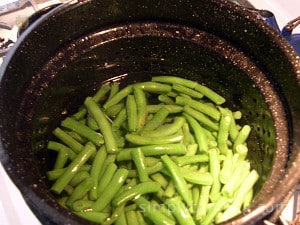
Then plunge them into cold or even ice water. This cools the beans and stops the cooking process.
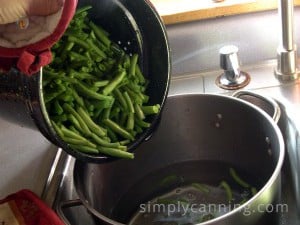
Drain well and cut into 1-inch pieces.
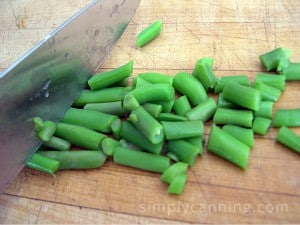
Place in a single layer on a dehydrator tray. Be sure the beans are spread enough that air flows freely around them.
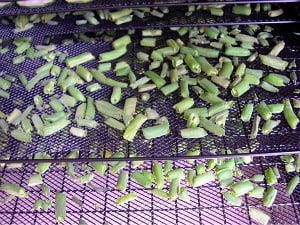
Dry at 125 degrees until dry and crispy. Check every so often (every couple of hours) and stir the beans around. This will encourage them to dry evenly.
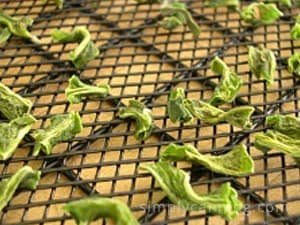
They are done when they are crispy. Store in an airtight container.
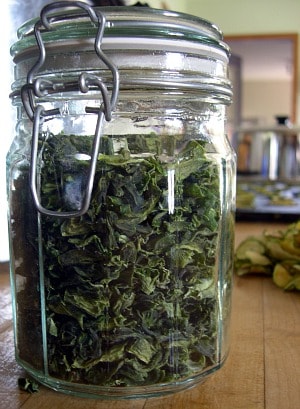
A good dehydrator is the essential piece of equipment. The most recommended is the Excalibur dehydrator.
I personally have a commercial dehydrator from Cabela’s, but I don’t think they’re available any longer. Maybe you can find another brand that’s similiar at Amazon?

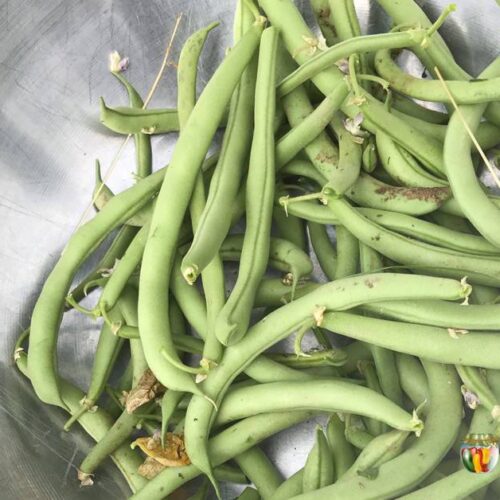
- Green Beans fresh & tender
- Water
- Ice
- Wash and snap ends off beans.
- Blanch in boiling water for 5 minutes.
- Plunge beans into ice water.
- Drain well. Cut into 1” pieces.
- Lay them out in a single layer on a dehydrator tray and let air flow around them.
- Dry at 125 degrees until dry and crispy.
- Store in an airtight container.
Drying and Storing Garden Beans
FAQ
What is the best way to dry green beans?
Why do you hang green beans to dry?
How do you dry green beans on the vine?
How do you dehydrate green beans from the garden?
